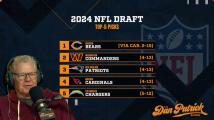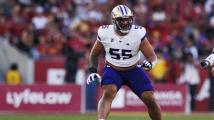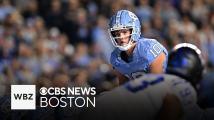How has drafting the QB position evolved in the NFL? | Zero Blitz
Yahoo Sports’ Jason Fitz, Jori Epstein and senior NFL reporter Charles Robinson break down how coaches and teams are evaluating and adapting to rookie quarterbacks entering the NFL. Hear the full conversation on “The Exempt List with Charles McDonald” - part of the “Zero Blitz” podcast - and subscribe on Apple Podcasts, Spotify or wherever you listen.
Video Transcript
JORI EPSTEIN: I've been working on this story on how teams evaluate quarterbacks, how the position has evolved, and how in some ways the demands of the position has evolved. Two stats really stood out to me. The first was I wanted to understand how often do we see a quarterback go 1, 2, 3 in the draft? Because it really feels like we're heading for that this year.
It happened in 1971, 1999, and then 2021. That's the only time we've ever seen quarterbacks go 1, 2, 3 in the draft. So we were going like every 20 plus years that this was coming about and teams were like, no, we just need to get a quarterback as soon as possible. And now, three years after it last happened, we're already there.
I added to that, I reached out to the NFL league office and I said, hey, have we ever had a time where the top three teams in the draft traded away their quarterback between the end of the season and the start of the draft? And they looked it up for me. Their data goes back to 1970 and this has never happened.
So you have the Chicago Bears traded away Justin Fields. The Commanders traded away Sam Howell. And then the Patriots traded away Mac Jones.
Those were three guys who were drafted by those teams, had not yet finished their rookie contracts, and were now dealt to another team, which again, should lead into the suspicion that the team is going to take a quarterback. And I just think it kind of shows, yes, we know there's pressure. Yes, we know we have trigger-happy owners. But we have actual data that says you as a quarterback and you as a team with that quarterback have to succeed more quickly than we've ever seen it before or else you don't have a chance.
And the other thing being that these coaches have had to adapt accordingly because these coaches are saying like, I can't just be like here's what I want. And if you're not there, I want you to become that. No, you're not as a coach going to be able to keep your job if you don't adapt and say, this quarterback has these strengths and these weaknesses, and I need to tailor my personnel and my scheme accordingly to accentuate the strengths and to minimize or mitigate or hide the weaknesses. And so I think it's really interesting how this impatience at the team ownership level has actually changed the way that teams are evaluating quarterbacks.
JASON FITZ: Because of the change in the salary cap and the way that they work the rookie contracts in the draft several years ago, now you don't have the investment that requires you be patient. If you can turn around and just buy a new car every year, you don't really care.
CHARLES ROBINSON: It fits.
JASON FITZ: Like they're just churning and burning players.
CHARLES ROBINSON: That's such a great point and especially if you approach it from the now when you have to make an extension decision, it is a way bigger deal than it used to be in the past. But it's just the dynamics that are now coming into play financially are so much more significant at the quarterback position now than they were years ago. It does force you to sit there and think, OK, we're two years in. Where is his trajectory? And do we need to start thinking about rebooting that position again so we're on a rookie quarterback deal again because this is not necessarily working. The finances have definitely played a part in this and we saw it play out with Fields, there's no doubt.



